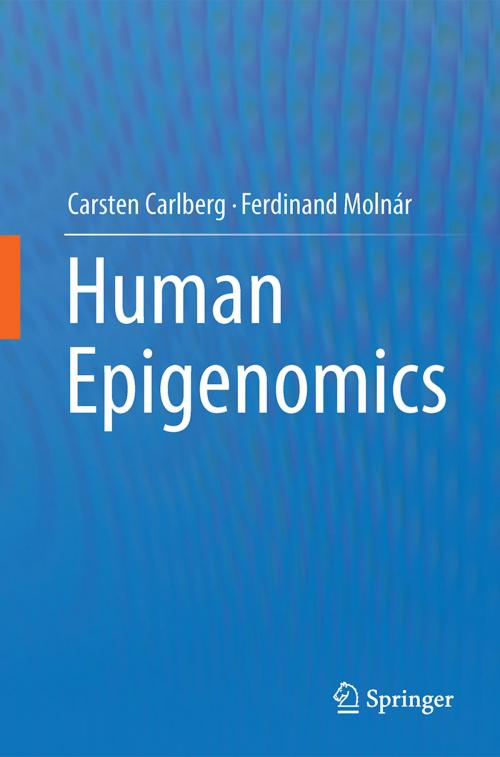Human Epigenomics
Nonfiction, Science & Nature, Science, Other Sciences, Molecular Biology, Health & Well Being, Medical, Medical Science, Genetics| Author: | Carsten Carlberg, Ferdinand Molnár | ISBN: | 9789811076145 |
| Publisher: | Springer Singapore | Publication: | February 1, 2018 |
| Imprint: | Springer | Language: | English |
| Author: | Carsten Carlberg, Ferdinand Molnár |
| ISBN: | 9789811076145 |
| Publisher: | Springer Singapore |
| Publication: | February 1, 2018 |
| Imprint: | Springer |
| Language: | English |
The term epigenetics describes regulatory and information storing mechanisms of specific genes that do not involve any change of their DNA sequence. Epigenetics is closely related to the extensively folded state, in which the genome is packaged, known as chromatin. New genomic tools nowadays allow the genome-wide assessment of, for example, chromatin states and DNA modifications, and led to the discovery of unexpected new epigenetic principles, such as epigenomic memory. This was the start of the field of epigenomics, the relation of which to human health and disease is discussed in this textbook.
This book aims to summarize, in a condensed form, the role of epigenomics in defining chromatin states that are representative of active genes (euchromatin) and repressed genes (heterochromatin). Moreover, this book discusses the principles of gene regulation, chromatin stability, genomic imprinting and the reversibility of DNA methylation and histone modifications. This information should enable a better understanding of cell type identities and will provide new directions for studies of, for example, cellular reprograming, the response of chromatin to environmental signals and epigenetic therapies that can improve or restore human health. In order to facilitate the latter, we favor a high figure-to-text ratio following the rule “a picture tells more than thousand words”.
The content of the book is based on the lecture course “Molecular Medicine and Genetics” that is given by one of us (C. Carlberg) in different forms since 2002 at the University of Eastern Finland in Kuopio. Thematically, this book is located between our textbooks “Mechanisms of Gene Regulation” (ISBN 978-94-017-7741-4) and “Nutrigenomics” (ISBN 978-3-319-30415-1), studying of which may also be interesting to our readers. The book is sub-divided into three sections and 13 chapters. Following the Introduction (section A), section B will explain the molecular basis of epigenomics, while section C will provide examples for the impact of epigenomics in human health and disease. The lecture course is primarily designed for Master level students of biomedicine, but is also frequented by PhD students as well as by students of other bioscience disciplines.
Besides its value as a textbook, **Human Epigenomics **will be a useful reference for individuals working in biomedicine.
The term epigenetics describes regulatory and information storing mechanisms of specific genes that do not involve any change of their DNA sequence. Epigenetics is closely related to the extensively folded state, in which the genome is packaged, known as chromatin. New genomic tools nowadays allow the genome-wide assessment of, for example, chromatin states and DNA modifications, and led to the discovery of unexpected new epigenetic principles, such as epigenomic memory. This was the start of the field of epigenomics, the relation of which to human health and disease is discussed in this textbook.
This book aims to summarize, in a condensed form, the role of epigenomics in defining chromatin states that are representative of active genes (euchromatin) and repressed genes (heterochromatin). Moreover, this book discusses the principles of gene regulation, chromatin stability, genomic imprinting and the reversibility of DNA methylation and histone modifications. This information should enable a better understanding of cell type identities and will provide new directions for studies of, for example, cellular reprograming, the response of chromatin to environmental signals and epigenetic therapies that can improve or restore human health. In order to facilitate the latter, we favor a high figure-to-text ratio following the rule “a picture tells more than thousand words”.
The content of the book is based on the lecture course “Molecular Medicine and Genetics” that is given by one of us (C. Carlberg) in different forms since 2002 at the University of Eastern Finland in Kuopio. Thematically, this book is located between our textbooks “Mechanisms of Gene Regulation” (ISBN 978-94-017-7741-4) and “Nutrigenomics” (ISBN 978-3-319-30415-1), studying of which may also be interesting to our readers. The book is sub-divided into three sections and 13 chapters. Following the Introduction (section A), section B will explain the molecular basis of epigenomics, while section C will provide examples for the impact of epigenomics in human health and disease. The lecture course is primarily designed for Master level students of biomedicine, but is also frequented by PhD students as well as by students of other bioscience disciplines.
Besides its value as a textbook, **Human Epigenomics **will be a useful reference for individuals working in biomedicine.















